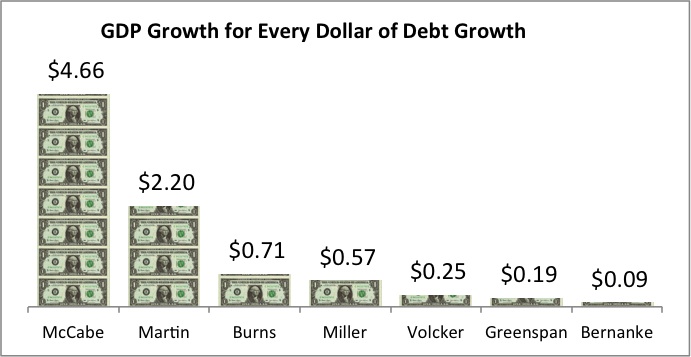Don't Expect the Fed to Protect Your Portfolio
Near-zero interest rates, high market valuations and monetary policy could make for an explosive brew. I'm counseling my clients to be prepared.

Profit and prosper with the best of Kiplinger's advice on investing, taxes, retirement, personal finance and much more. Delivered daily. Enter your email in the box and click Sign Me Up.
You are now subscribed
Your newsletter sign-up was successful
Want to add more newsletters?
If you have read my previous articles, you know that I'm worried about what lies ahead for the markets. In my opinion, the Federal Reserve is following a failed strategy that results in a boom-bust cycle. The tech bubble collapsed under former Fed chairman Alan Greenspan; the housing bubble collapsed under Ben Bernanke; and the Bernanke/Janet Yellen bond bubble is teetering.
Worse is the mountain of debt the Fed helps create to stimulate the economy after each bust. This mountain of debt has had diminishing economic returns, meaning it takes more debt to create less economic activity. A combination of record-low yields, extreme market overvaluation and a Fed whose policies are ineffective should worry wise investors.
It's hard to say how President-elect Trump might play into the story. Since he is so unpredictable, we really have no idea what he will do. However, his past statements might indicate that he is in favor of low rates. So, if the Fed were to start raising rates, and the economy began to slip even a little, I would expect Trump to bring a ton of pressure on the Fed to keep stimulating the economy.
From just $107.88 $24.99 for Kiplinger Personal Finance
Become a smarter, better informed investor. Subscribe from just $107.88 $24.99, plus get up to 4 Special Issues

Sign up for Kiplinger’s Free Newsletters
Profit and prosper with the best of expert advice on investing, taxes, retirement, personal finance and more - straight to your e-mail.
Profit and prosper with the best of expert advice - straight to your e-mail.
So be prepared. There are a number of strategies that can be deployed to take advantage of these Fed bubbles. Here are a few ways to protect your portfolio:
- Shorten bond durations and increase quality.
- Raise cash.
- Avoid interest rate sensitive issues like preferred stocks, banks and bonds.
- Review your equity portfolio and reduce your risks.
- Lower the average price-earnings ratio on your holdings. That stock in your portfolio with a 32 P/E and earnings growth of only 5% might be a good candidate to sell.
- Utilize various bear market strategies and securities.
The Fed's policies have resulted in diminishing economic returns. With interest rates near all-time lows and the stock market near all-time highs, how can this be happening? First, let's review what the Fed does and how it impacts the economy.
The Federal Reserve guides the economy through recessions and recoveries with interest rates. To speed up the economy, the central bankers lower interest rates. To slow the economy down, they raise rates. The raising and lowering of rates also has an impact on debt.
As rates rise, debt becomes more expensive, so its growth slows. When rates are lower, debt is cheaper, and so the amount of debt increases. To achieve these goals, the Fed raises and lowers the money supply. The more money in the system, the lower rates go. When the Fed pulls money out of the system, rates rise.
To see if such use of monetary policy is actually effective, let's look at its impact on the economy.
Debt is often referred to as "leverage" because it can give you an economic return much greater than what you put in, the same way a lever is able to multiply the strength of the user to move heavy objects.
If the Fed's monetary policy is working, we should see increases in economic growth that exceeds the growth of debt. That hasn't happened, however, since the 1970s. Take a look at this chart tracking economic growth under seven Fed chairs up through Ben Bernanke to see what I'm talking about. The data is from the Federal Reserve of St. Louis:

Fed chairs Thomas B. McCabe and William McChesney Martin Jr. understood the idea of leverage. For every dollar of debt expansion under their tenures, the gross domestic product grew $4.66 and $2.20 respectively. Quite impressive.
With Fed chair Arthur Burns, the Fed's impact starts to nosedive. Burns was only able to get 71 cents of GDP growth for every dollar of debt expansion. By the time we get to Alan Greenspan, who was heralded as a genius, he was able to eke out 19 cents of economic growth for every dollar of debt growth.
Bernanke outdid his predecessor by squeezing only 9 cents of GDP gain for every dollar of debt growth. Granted, he was also the Fed chairman to preside over the worst economic collapse since the Great Depression, so he gets some points for keeping things from getting worse. Of course he could have recognized the housing bubble happening and prevented the collapse in the first place, but let's not quibble about who saw a bubble and who didn't.
Yellen's tenure is too short to know how things will work out. But the trend is pretty clear, in my opinion—less and less economic growth requiring more and more fiscal stimulus and debt.
For investors, do not expect the Federal Reserve to notify you that they have created a bubble. Greenspan famously said you can't see bubbles until after they pop. Bernanke assured investors that the housing market was solid just months before its collapse. And today, not a word of warning from the Fed about a potential bond bubble.
And this is my concern. Near-zero interest rates, record-high stock market valuation and a Fed that continues to follow a failed monetary policy adds up to another bubble, in my view. And its impact could be much more widespread than previous bubbles that popped.
There are strategies and investments that can be deployed that are actually designed to gain as the markets fall. By raising cash and utilizing some of these strategies, you could have the money to buy good investments when they become cheap.
As for the Fed, their policies are not helping long-term investors. Boom-and-bust cycles are not a good environment in which to invest. Investors need to be wary of both sides of the cycle and understand they won't hear a warning from the Fed about a bubble about to burst.
John Riley, registered Research Analyst and the Chief Investment Strategist at CIS, has been defending his clients from the surprises Wall Street misses since 1999.
Disclosure: Third party posts do not reflect the views of Cantella & Co Inc. or Cornerstone Investment Services, LLC. Any links to third party sites are believed to be reliable but have not been independently reviewed by Cantella & Co. Inc or Cornerstone Investment Services, LLC. Securities offered through Cantella & Co., Inc., Member FINRA/SIPC. Advisory Services offered through Cornerstone Investment Services, LLC's RIA. Please refer to my website for states in which I am registered.
Profit and prosper with the best of Kiplinger's advice on investing, taxes, retirement, personal finance and much more. Delivered daily. Enter your email in the box and click Sign Me Up.

In 1999, John Riley established Cornerstone Investment Services to offer investors an alternative to Wall Street. He is unique among financial advisers for having passed the Series 86 and 87 exams to become a registered Research Analyst. Since breaking free of the crowd, John has been able to manage clients' money in a way that prepares them for the trends he sees in the markets and the surprises Wall Street misses.
-
 Americans, Even With Higher Incomes, Are Feeling the Squeeze
Americans, Even With Higher Incomes, Are Feeling the SqueezeA 50-year mortgage probably isn’t the answer, but there are other ways to alleviate the continuing sting of high prices
-
 Hiding the Truth From Your Financial Adviser Can Cost You
Hiding the Truth From Your Financial Adviser Can Cost YouHiding assets or debt from a financial adviser damages the relationship as well as your finances. If you're not being fully transparent, it's time to ask why.
-
 How to Manage a Disagreement With Your Financial Adviser
How to Manage a Disagreement With Your Financial AdviserKnowing how to deal with a disagreement can improve both your finances and your relationship with your planner.
-
 Are You Honest With Your Financial Adviser? Why Hiding the Truth Can Cost You
Are You Honest With Your Financial Adviser? Why Hiding the Truth Can Cost YouHiding assets or debt from a financial adviser damages the relationship as well as your finances. If you're not being fully transparent, it's time to ask why.
-
 5 Actions to Set Up Your Business With Your Exit in Mind, From a Wealth Adviser
5 Actions to Set Up Your Business With Your Exit in Mind, From a Wealth AdviserWhen you're starting a business, it may seem counterintuitive to begin with exit planning. But preparing will put you on a more secure footing in the long run.
-
 Missed Your RMD? 4 Ways to Avoid Doing That Again (and Skip the IRS Penalties), From a Financial Planner
Missed Your RMD? 4 Ways to Avoid Doing That Again (and Skip the IRS Penalties), From a Financial PlannerIf you miss your RMDs, you could face a hefty fine. Here are four ways to stay on top of your payments — and on the right side of the IRS.
-
 What Really Happens in the First 30 Days After Someone Dies (and Where Families Get Stuck)
What Really Happens in the First 30 Days After Someone Dies (and Where Families Get Stuck)The administrative requirements following a death move quickly. This is how to ensure your loved ones won't be plunged into chaos during a time of distress.
-
 AI-Powered Investing in 2026: How Algorithms Will Shape Your Portfolio
AI-Powered Investing in 2026: How Algorithms Will Shape Your PortfolioAI is becoming a standard investing tool, as it helps cut through the noise, personalize portfolios and manage risk. That said, human oversight remains essential. Here's how it all works.
-
 A Newly Retired Couple With a Portfolio Full of Winners Faced a $50,000 Tax Bill: This Is the Strategy That Helped Save Them
A Newly Retired Couple With a Portfolio Full of Winners Faced a $50,000 Tax Bill: This Is the Strategy That Helped Save ThemLarge unrealized capital gains can create a serious tax headache for retirees with a successful portfolio. A tax-aware long-short strategy can help.
-
 5 Retirement Myths to Leave Behind (and How to Start Planning for the Reality)
5 Retirement Myths to Leave Behind (and How to Start Planning for the Reality)Separating facts from fiction is an important first step toward building a retirement plan that's grounded in reality and not based on incorrect assumptions.
-
 I'm a Financial Adviser: Silence Is Golden, But It Hurts Your Heirs More Than You Think
I'm a Financial Adviser: Silence Is Golden, But It Hurts Your Heirs More Than You ThinkTalking to heirs about transferring wealth can be overwhelming, but avoiding it now can lead to conflict later. Here's how to start sharing your plans.